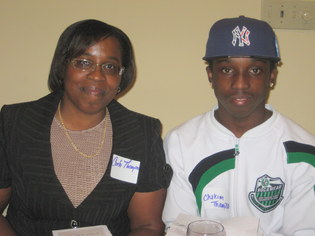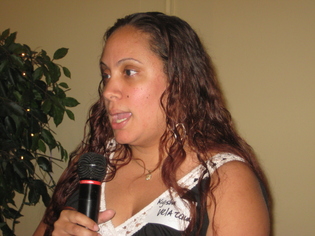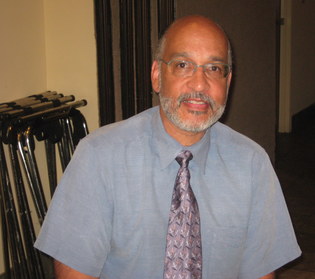 Chakim Thompson changed his friends and stayed off the streets — and out of the criminal justice system — thanks to the first year of a New Haven experiment.
Chakim Thompson changed his friends and stayed off the streets — and out of the criminal justice system — thanks to the first year of a New Haven experiment.
Chakim (pictured with his mom, Carla) told a roomful of adults Tuesday evening exactly what he thought about New Haven’s Juvenile Review Board — and it was music to their ears.
They were gathered at the Greek Olive restaurant on Sargent Drive to celebrate the first anniversary of the program, which is run by New Haven Family Alliance.
Juvenile Review Boards (JRBs) were set up around the state to divert youth who commit misdemeanors away from the juvenile justice system into a community-based program. Their cases are heard by a panel of community volunteers. The JRBs are based on the concept of balanced and restorative justice, which takes into account the the needs of the youth, the victim and the community. To complete the program, the youth must take responsibility for his or her actions and make amends. (Click here for an article about the formation of New Haven’s JRB.)
Neither Chakim, who’s 15, nor his mother, Carla Thompson (pictured above), would say what his offense was, beyond “being in the wrong place at the wrong time” and creating “a big misunderstanding.” But they both raved about the JRB process.
Thompson thanked his case managers and said, “If it weren’t for them, I’d probably be in Juvenile. They helped me a lot. I stayed off the streets, I stopped hanging with the wrong people, and I learned to make better choices,” after attending four Saturday sessions facilitated by a panel of community volunteers.
Carla Thompson spoke too. Though she acknowledged being nervous, she spoke in sure, confident tones. “I strongly believe that since my son has completed this program, he has made an immense leap toward improvement. He now takes the time to think about his actions before making a move.
“No, he doesn’t stop to think all the time,” she said, provoking knowing laughter, “and sometimes he needs a little reminder. But he is still a child and he will continue to make mistakes. As long as we keep reminding them of their wrongdoing, and are there to catch them when they fall, they will hopefully stay on the right road to success.” She ended by saying she wanted to join one of the volunteer panels herself in order to help other kids.
 Program coordinator Kyesha Velazquez (pictured) said New Haven’s program is one of 40 JRBs in the state. She credited the decision of the 27-member advisory board to take only non-violent first offender misdemeanor cases as key to the success of the program, which has so far diverted 153 youth — ages 8 to 15 — from the juvenile justice system. Almost half were girls. Kids from Fair Haven and the Hill each made up more than 20 percent of the total clients.
Program coordinator Kyesha Velazquez (pictured) said New Haven’s program is one of 40 JRBs in the state. She credited the decision of the 27-member advisory board to take only non-violent first offender misdemeanor cases as key to the success of the program, which has so far diverted 153 youth — ages 8 to 15 — from the juvenile justice system. Almost half were girls. Kids from Fair Haven and the Hill each made up more than 20 percent of the total clients.
If you wonder why an 8‑year-old was in the program in the first place (there were actually six 8‑year-olds), Barbara Fair wonders too. She was on the advisory board that formulated the program, and spoke briefly at the dinner. She praised the JRB but said, “I hope we get to the point where we’re not arresting 8‑year-old kids.”
Two-thirds of the clients were African-American, 30 percent were Latino and just under two percent were white. Velazquez noted that 64 of the participants were discharged successfully, 3 were discharged without completing the program, and 83 of the 155 are still actively participating.
The panel members facilitate what’s called balanced and restorative justice, with victims and offenders both participating. It’s funded by the State Department of Children and Families through a contract with the Family Alliance. Community Mediation, the Board of Education and the New Haven Police Department, and the state’s Court Support Services Division, collaborate on the program. Schools Superintendent Reginald Mayo and top school administrator Leida Pacini were there, along with State Reps. Toni Walker (who was thanked for her leadership on the issue) and Pat Dillon, and Alders Joe Rodriguez and Michelle Edmonds Sepulveda.
Volunteer Melissa Sarfaty, who works for the Board of Education, pointed out a big benefit for the youth who participate. “They get to understand the harm they’ve done. So many times we dish out punishments to our young people, but we don’t explain what the effect is. And there’s not only an effect on the victim, but it extends into the community.”.
 Todd Foster (pictured), pastor of Church on the Rock, was a member of the Advisory Board. He recruited several members of his church to be panel members. “They’re enjoying it, and most of all, it’s making a difference. That’s exciting, that this thing is working.”
Todd Foster (pictured), pastor of Church on the Rock, was a member of the Advisory Board. He recruited several members of his church to be panel members. “They’re enjoying it, and most of all, it’s making a difference. That’s exciting, that this thing is working.”

Congratulations!!! I know the team at New Haven Family Alliance worked really hard to be successful with this program. A special congratulations goes out to Kyisha. She is an awesome, hard working, intelligent young woman. She is a major asset to the program's success.